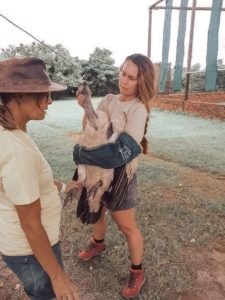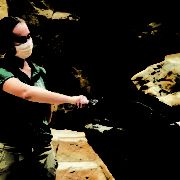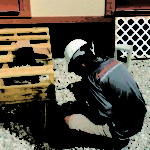Saving Vultures- Putting an end to their bad reputations
 by Kirsti Mahon, Naples Zoo Show Keeper
by Kirsti Mahon, Naples Zoo Show Keeper
Though my animal training career began almost 10 years ago working with dolphins, my heart landed working with land mammals and birds. Never did I imagine that one of my favorites would be vultures.
Our resident black vulture, Omen, has not only taught me so much in regard to training, but he has also inspired me to be an advocate for vultures all over the world.
Unfortunately, due to negative media and a deep misunderstanding, vultures get a bad reputation. Often seen as evil or a nuisance, their true value in our ecosystem can be overlooked.
Vultures play a vital role in environmental cleanup, especially on our roadways where they are commonly seen.
Perfectly adapted, they are able to consume carcasses infected with deadly pathogens such asbotulism and salmonella without consequences.
Last fall the opportunity arose to volunteer at VulPro, a world-renowned and well recognized vulture conservation organization in Hartbeespoort, South Africa. Thanks to the Naples Zoo Conservation program and the Glass family, I was able to use my skills in the field and expand my knowledge of vulture conservation.
My stay at VulPro was nothing short of memorable. I began my work with assisting in power line surveys, a task regularly done to check for injured or deceased vultures that have collided with power lines, a common threat to their species.
Over the past few years, VulPro has built a relationship working with power line companies to educate and hopefully encourage changes to their power lines for easier navigation to vultures in flight.
While out doing surveys, we received a call of an injured vulture that was believed to be poisoned. Although it was a 5+ hour drive, VulPro is the only organization in the area available to offer assistance to these threatened species.
Unfortunately, the long travel, overnight observation and fluids were not enough to save the young fledgling, who in the end was believed to have died due to dehydration with South Africa’s rising temperatures.
Once we arrived back to VulPro, I had the opportunity to assist with the closing of their annual health exams, including blood draws, checking body conditions and accessing old injuries. The remainder of my stay was filled with the daily responsibilities to care for their resident and injured vultures who are unable to be released.
Similar to my daily duties at Naples Zoo, I helped with cleaning, feeding and observations for their reports.
When I visited VulPro, they housed a large variety of New and Old World vulture species and even other birds of prey that needed rescuing. These species included: a South American black vulture, palm-nut vultures, Cape vultures, a South American king vulture, lappet-faced vultures, an African fish eagle, white-headed vultures, Andean condors and African white-backed vultures.
Though my time with VulPro was short, the knowledge I gained was immeasurable. The entire staff at VulPro does an incredible job doing all they can to conserve all vulture species while educating their local communities of the importance of their survival. I am forever grateful for this opportunity and look forward to continuing my passion for conserving wildlife, especially the ones with the bad reputations.




Leave a Reply
Want to join the discussion?Feel free to contribute!